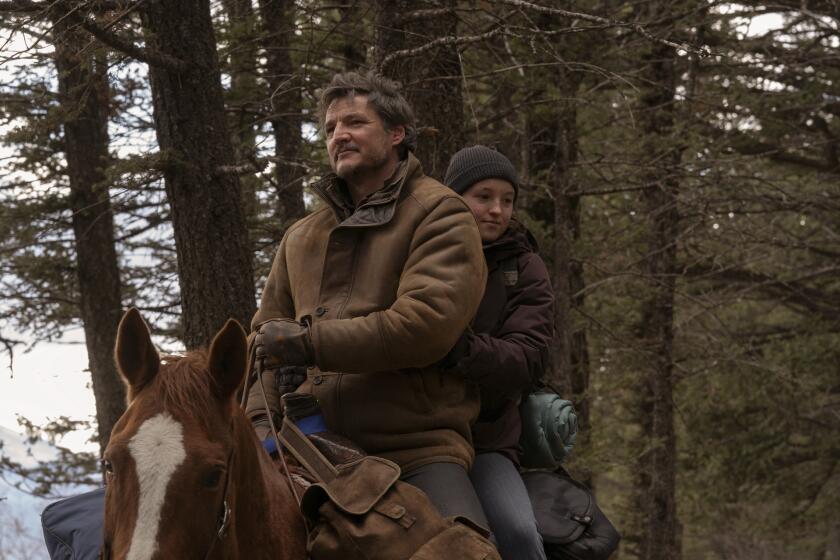‘Romeo and Juliet’ ... and me
- Share via
It wasn’t the words of Shakespeare that sprang to mind Monday night as I found myself sitting onstage at the $240-million Renée and Henry Segerstrom Concert Hall in Costa Mesa, surrounded by members of the Pacific Symphony, my trusty clarinet in my lap, the score to Prokofiev’s “Romeo and Juliet” ballet music laid out before me and music director Carl St.Clair wielding his baton in front of us.
No, it was the immortal question posed by Talking Heads singer David Byrne: “You may ask yourself, ‘Well ... how did I get here?’”
On one level, the answer was simple: Last month, a Pacific Symphony email about a program called “OC Can You Play With Us?” hit my inbox.
“Orange County musicians are invited to perform with the orchestra under music director Carl St.Clair … for a unique opportunity to rehearse and perform selections from Prokofiev’s ‘Romeo and Juliet’ on the stage of the Renée and Henry Segerstrom Concert Hall,” the email stated. “Participants [are] chosen on a first-come, first-served basis with no audition required.”
That was all I needed to see.
I signed on, then reached out to St.Clair to ask about the orchestra’s reasons for bravely opening its ranks, if only for a night, to the likes of me.
“For us, it’s a chance in a very positive way to have an active collaboration with many people who are regular members of our audience, to have a chance to make music with them, not just play for them,” he said. “It gives us a different relationship with them. What it also does is it gives people a chance to reacquaint themselves with making music, as opposed to just listening on the radio or in a concert.”
Response last year when the orchestra initiated the program was so strong that this year it was expanded to four groups playing over two nights to accommodate twice as many participants: nearly 150 this year — me included — bowing and blowing side by side with 55 orchestra regulars. And not the orchestra’s equivalent of a baseball team’s bench players either. Concert master Raymond Kobler was in his usual chair at St.Clair’s left hand, and I was sandwiched between principal clarinetist Benjamin Lulich and his symphony mate David Chang.
As noted by one of the other program participants, bassist Dennis McNutt, who took up the instrument as an adult: “Having the opportunity to play with world-class musicians is a bit like a wannabe football player being invited to the Super Bowl, except no one will get hurt!”
Thinking back on my struggle over the last four weeks to whip my flabby lips back into shape for the clarinet, I thought, “Speak for yourself, Dennis.”
The full program consisted of weeks of individual practice by the amateurs, one volunteer sectional rehearsal two weeks ago and about an hour onstage Monday and Tuesday nights, each batch of players going over what they’d worked up, under St.Clair’s tutelage.
As we worked through the technically challenging Minuet — which in the original Cyrillic looks prophetically like the word “Mayhem” — I flashed back to the words I heard myself utter when I talked my way into this thing: “The music shouldn’t be a problem” — in effect, saying “It’s Prokofiev! How hard can it be?”
I quickly found out. The Minuet modulates from the amateur-friendly key of C into punishing passages of seven sharps. It’s been a while since music-theory class, but I think that’s the key of Z. Hey, when I was studying this stuff in the ‘60s and ‘70s, Pluto was still a planet and, as I recall, only five of the known sharps and maybe four flats had yet been discovered.
Nevertheless, I forged ahead, the rarity of the opportunity fueling my wish to persevere through wind, rain, sleet and ungodly key signatures.
The truth is, as much liberating fun as it can be to play with a few pals in a rock band, jazz combo or chamber music group — all of which I’ve done and still do — there’s something uniquely transformative that can happen when a large group of disparate individuals yield their differences under the guidance of an inspired and knowledgeable leader to bring a singular vision to reality. (Congress might want to give it a whirl sometime.)
St.Clair was giving us lessons not only in music but in social and cultural unity: Some goals can be realized only when the individual’s drive for self-expression gives way to collaboration in service of a higher purpose.
I’d experienced that transcendent moment three times in my musical life: once as a member of the Villa Park High School marching band, another in an all-district honor band, and then during a Cal State Fullerton Wind Ensemble concert.
On Monday it happened again, if only briefly, and the clarinets weren’t even playing. It was at the very beginning of the piece, following a loud, brassy, very-Prokofiev introduction that dramatically subsides to reveal shimmering, otherworldly strings rising up from the cacophony.
At the end of the evening, I asked McNutt if it had been all he’d expected. “I’ll never forget this night,” he said.
Me? I remembered the title of that Talking Heads song: “Once In a Lifetime.”
Staff writer Randy Lewis has covered pop music for The Times since 1981 and has played rock, pop, classical and jazz music on various instruments since he can remember.
ALSO:
Jazz says its final goodbye on Los Angeles AM radio
Tony Nominations 2012: Silver lining to a mostly cloudy season
Who will pay $80 million (or so) for Edvard Munch’s ‘The Scream’?
More to Read
The biggest entertainment stories
Get our big stories about Hollywood, film, television, music, arts, culture and more right in your inbox as soon as they publish.
You may occasionally receive promotional content from the Los Angeles Times.










